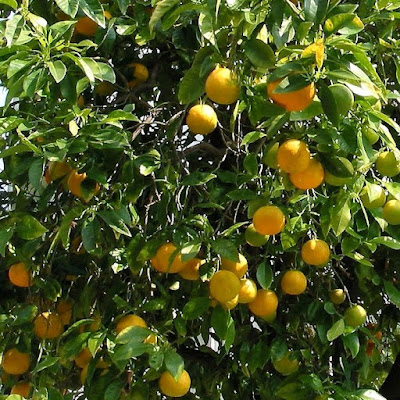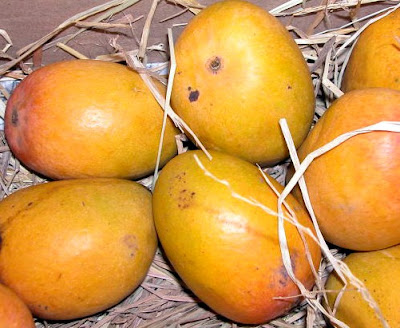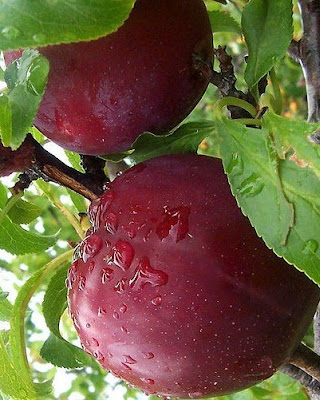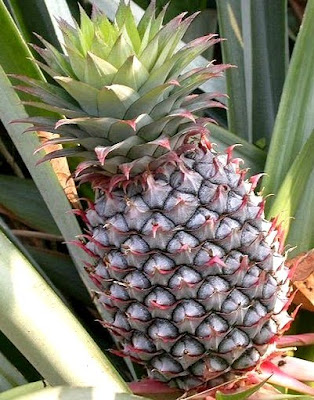Guava (Psidium sp) are small tropical trees belonging to genus Psidium comprising nearly hundred species.
They are native plants of northern South America, southern Central America and Southeast Asia.
Guava are presently cultivated through out the tropical and subtropical regions of the world. Psidium guajava (apple guava) is the most cultivated species.
Guava fruit is rich in vitamin A, vitamin C and dietary fibre. Four times the dietary requirement of vitamin C is present in 100g of the fruit.
The high dietary fibre is contributed by the seeds and the fruit functions as good laxative. It contains omega-6 and omega-3 polyunsaturated fatty acids.
The fruit has good levels of potassium and magnesium. Antioxidants like polyphenols and carotenoids are present in considerable amounts.
In herbal medicine its leaves and bark are used for treating diarrhea, dysentery and fever.
Nutrient values and weights given below are calculated for edible portion. The skin portion of it makes up to 20% of the weight of the fruit.

Fruit facts: Guava nutrition
| Nutrients | Units | Value per 100g | One cup 165g | One medium size 55g |
|---|---|---|---|---|
| Water | g | 80.80 | 133.32 | 44.44 |
| Energy | kcal | 68 | 112 | 37 |
| Carbohydrate | g | 14.32 | 23.63 | 7.88 |
| Protein | g | 2.55 | 4.21 | 1.40 |
| Lipid (fat) | g | 0.95 | 1.57 | 0.52 |
| Sugars | g | 8.92 | 14.72 | 4.91 |
| Ash | g | 1.39 | 2.29 | 0.76 |
| Dietary fibre | g | 5.4 | 8.9 | 3.0 |
Fruit facts: Guava minerals nutrition
| Minerals | Units | Value per 100g | One cup 165g | One medium size 55g |
|---|---|---|---|---|
| Calcium | mg | 18 | 30 | 10 |
| Selenium | mcg | 0.6 | 1.0 | 0.3 |
| Iron | mg | 0.26 | 0.43 | 0.14 |
| Manganese | mg | 0.15 | 0.25 | 0.08 |
| Magnesium | mg | 22 | 36 | 12 |
| Copper | mg | 0.23 | 0.38 | 0.13 |
| Phosphorus | mg | 40 | 66 | 22 |
| Zinc | mg | 0.23 | 0.38 | 0.13 |
| Sodium | mg | 2 | 3 | 1 |
| Potassium | mg | 42 | 69 | 23 |
Fruit facts: Guava vitamins nutrition
| Vitamins nutrition | Units | Value per 100g | One cup 165g | One medium size 55g |
|---|---|---|---|---|
| Vitamin C | mg | 228.3 | 376.7 | 125.6 |
| Thiamin | mg | 0.067 | 0.111 | 0.037 |
| Riboflavin | mg | 0.04 | 0.07 | 0.02 |
| Niacin | mg | 1.08 | 1.79 | 0.60 |
| Pantothenic acid | mg | 0.45 | 0.74 | 0.25 |
| Vitamin B6 | mg | 0.11 | 0.18 | 0.06 |
| Folate | mcg | 49 | 81 | 27 |
| Choline | mg | 7.6 | 12.5 | 4.2 |
| Vitamin A, IU | IU | 624 | 1030 | 343 |
| Lycopene | mcg | 5202 | 8587 | 2862 |
| Vitamin E (alpha-tocopherol) | mg | 0.73 | 1.20 | 0.40 |
| Vitamin K (phylloquinone) | mcg | 2.6 | 4.3 | 1.3 |
Fruit facts: Guava lipids nutrition
| Lipids nutrition facts | Units | Value per 100g | One cup 165g | One medium size 55g |
|---|---|---|---|---|
| Saturated fatty acids | g | 0.27 | 0.45 | 0.15 |
| Monounsaturated fatty acids | g | 0.09 | 0.14 | 0.05 |
| Polyunsaturated fatty acids | g | 0.40 | 0.66 | 0.22 |
Fruit facts: Guava amino acids nutrition
| Amino acids nutrition | Units | Value per 100g | One cup 165g | One medium size 55g |
|---|---|---|---|---|
| Tryptophan | g | 0.02 | 0.04 | 0.01 |
| Serine | g | 0.08 | 0.12 | 0.04 |
| Threonine | g | 0.10 | 0.16 | 0.05 |
| Proline | g | 0.08 | 0.13 | 0.04 |
| Isoleucine | g | 0.09 | 0.15 | 0.05 |
| Glycine | g | 0.13 | 0.21 | 0.07 |
| Leucine | g | 0.17 | 0.28 | 0.09 |
| Glutamic acid | g | 0.33 | 0.55 | 0.18 |
| Lysine | g | 0.07 | 0.12 | 0.04 |
| Aspartic acid | g | 0.16 | 0.27 | 0.09 |
| Methionine | g | 0.02 | 0.03 | 0.01 |
| Alanine | g | 0.13 | 0.21 | 0.07 |
| Phenylalanine | g | 0.01 | 0.01 | 0.00 |
| Histidine | g | 0.02 | 0.04 | 0.01 |
| Tyrosine | g | 0.03 | 0.05 | 0.02 |
| Arginine | g | 0.07 | 0.11 | 0.04 |
| Valine | g | 0.09 | 0.14 | 0.05 |
Source: USDA National Nutrient Database










